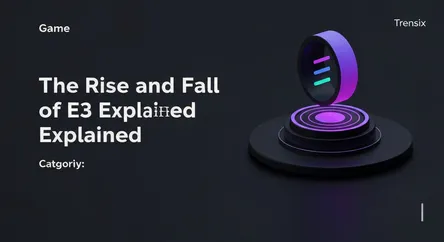Game
The Rise and Fall of E3 Explained

Discover the history of E3, the iconic video game trade show. Learn why it was cancelled and how its absence is reshaping the gaming industry.
What is it?
The Electronic Entertainment Expo, or E3, was an annual trade event for the video game industry. For decades, it was the premier global stage where developers, publishers, and hardware manufacturers showcased upcoming games and technologies. Held in Los Angeles, E3 was a spectacle of blockbuster announcements, game demos, and press conferences from industry giants like Nintendo, Sony, and Microsoft. It was the epicenter of gaming news and hype, setting the tone for the industry's year ahead and giving fans a first look at the most anticipated titles.
Why is it trending?
E3 is trending because after years of declining relevance and several cancellations, the event was officially declared permanently defunct in late 2023. The trend began when major publishers opted out to host their own digital presentations, such as Nintendo Direct and State of Play. This shift, accelerated by the pandemic, led to the rise of alternatives like Geoff Keighley's Summer Game Fest. With key players no longer participating, E3 lost its critical mass and influence, making its cancellation a major talking point about the industry's evolution.
How does it affect people?
The end of E3 changes how the gaming world operates. For gamers, the centralized week of gaming news has been replaced by a longer season of announcements spread across various streams. For developers, especially smaller studios, it removes a major, albeit expensive, platform for gaining visibility. Journalists and content creators now cover a scattered landscape of digital events rather than one massive, in-person gathering, altering how games are revealed and how industry professionals network.